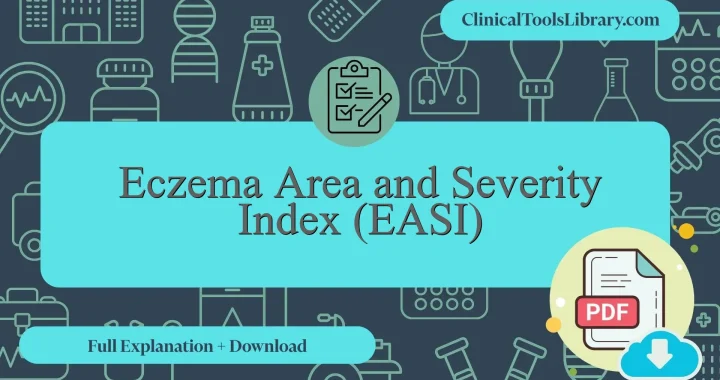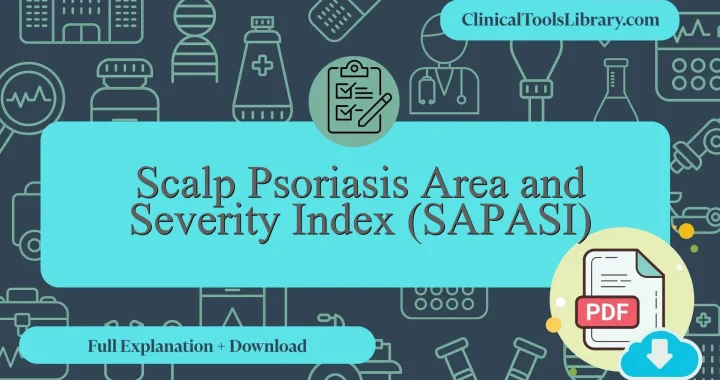In this article, we explain everything you need to know about the Physician’s Global Assessment (PGA). We will cover the aspects it evaluates, the target population, a detailed step-by-step explanation, and how to interpret its results. Additionally, we will dive into the scientific evidence supporting this tool (diagnostic sensitivity and specificity) in clinical assessment. You will also find official and unofficial sources available for download in PDF format.
What does the Physician’s Global Assessment (PGA) assess?
The Physician’s Global Assessment (PGA) evaluates the overall disease activity in patients with chronic inflammatory conditions such as rheumatoid arthritis, psoriasis, lupus, and inflammatory bowel disease (IBD). Utilizing a standardized Physician Global Assessment scale, clinicians assign a numerical PGA score that reflects the current severity of the disease based on clinical judgment and patient findings. The main purpose of the PGA is to provide an objective, quantifiable measure of disease status to monitor therapeutic response and guide treatment decisions. Tools such as the Physician Global Assessment calculator and resources like the Physician Global assessment PDF support consistency and accuracy in scoring across diverse clinical settings.
For which type of patients or populations is the Physician’s Global Assessment (PGA) intended?
The Physician’s Global Assessment (PGA) is primarily indicated for patients with chronic inflammatory conditions such as rheumatoid arthritis, psoriasis, and systemic lupus erythematosus. It is a valuable tool in both clinical trials and routine practice to evaluate overall disease activity by integrating clinical findings, laboratory results, and patient symptoms into a single summary measure. The PGA is most useful in monitoring disease progression, assessing treatment response, and guiding therapeutic decisions. Its application is particularly relevant in contexts requiring quantification of disease severity, such as assessing the Physician Global Assessment score psoriasis or the Physician global assessment rheumatoid arthritis. The use of standardized measures like the Physician Global Assessment scale or the Physician Global Assessment calculator enhances consistency and reliability across evaluations, facilitating improved patient management.
Step-by-Step Explanation of the Physician’s Global Assessment (PGA)
The Physician’s Global Assessment (PGA) involves a systematic evaluation comprising a single-item measure designed to assess overall disease activity. The clinician rates disease severity on a visual analogue scale (VAS) or a numeric rating scale (NRS), typically ranging from 0 to 10 or 0 to 100, where 0 indicates no disease activity and the maximum score signifies severe disease. The assessment focuses on clinical signs, symptoms, and laboratory results related to rheumatoid arthritis, psoriasis, or other inflammatory conditions. The response format is a continuous scale, facilitating sensitive detection of changes over time. The process requires careful consideration of patient history and physical examination findings to provide an objective, yet holistic, representation of disease status in a single score.
Physician Global Assessment (PGA) PDF Resources for Rheumatoid Arthritis, Psoriasis & IBD
Downloadable resources featuring the original and English versions of the Physician Global Assessment PDF are provided below to support clinical evaluation. These documents include the standardized Physician Global Assessment scale, enabling accurate determination of the Physician Global Assessment score for conditions such as rheumatoid arthritis, psoriasis, and IBD. Utilizing these tools assists healthcare professionals in effectively measuring disease activity and optimizing patient management strategies.
How to interpret the results of the Physician’s Global Assessment (PGA)?
The Physician’s Global Assessment (PGA) is a standardized tool used to evaluate the overall severity of a patient’s condition, particularly in chronic inflammatory diseases such as psoriasis or rheumatoid arthritis. Scores typically range from 0 (clear) to 5 or 7 (severe), with reference values calibrated according to specific disease activity scales. Interpretation involves comparing the numerical score against established benchmarks: for example, a PGA score ≤1 often indicates minimal or no disease activity, whereas scores ≥3 suggest moderate to severe involvement requiring therapeutic intervention. Healthcare providers utilize these results to tailor management plans; a significant increase in the PGA score may necessitate escalation of treatment, while stable low scores reinforce current therapeutic efficacy. The formula for assessing change can be expressed as ΔPGA = PGA_post – PGA_pre, where ΔPGA >1 indicates clinically meaningful progression. Thus, the PGA offers a quantitative measure that aids in monitoring disease activity and guiding clinical decisions.
What scientific evidence supports the Physician’s Global Assessment (PGA) ?
The Physician’s Global Assessment (PGA) has been extensively validated as a reliable clinical tool used primarily in the evaluation of disease activity in rheumatoid arthritis and other inflammatory conditions. Originally introduced in the 1980s, the PGA integrates clinical judgment with standardized scoring systems to quantify overall disease severity. Multiple studies have demonstrated its strong correlation with established measures such as joint counts, laboratory markers of inflammation, and patient-reported outcomes. Furthermore, longitudinal research confirms the PGA’s sensitivity to changes in disease activity over time, supporting its utility in both clinical trials and routine practice. Its inclusion in composite indices like the Disease Activity Score (DAS) corroborates its influential role in guiding therapeutic decisions based on objective evidence.
Diagnostic Accuracy: Sensitivity and Specificity of the Physician’s Global Assessment (PGA)
The Physician’s Global Assessment (PGA) demonstrates variable sensitivity and specificity depending on the clinical context and disease assessed. In studies evaluating psoriasis, the PGA sensitivity typically ranges from 75% to 85%, while specificity varies between 70% and 90%, reflecting its utility in accurately identifying disease severity. For rheumatoid arthritis, sensitivity has been reported around 80%, with specificity near 85%, supporting PGA’s role in recognizing active disease versus remission. However, variability arises due to subjective interpretation and differences in scoring scales, which can affect diagnostic accuracy. Overall, the PGA remains a valuable, though complementary, tool in the clinical assessment, with sensitivity and specificity metrics that are context-dependent and should be considered alongside other objective measures.
Related Scales or Questionnaires
The Physician’s Global Assessment (PGA) is often compared to other validated tools such as the Clinical Disease Activity Index (CDAI) for rheumatoid arthritis, the Systemic Lupus Erythematosus Disease Activity Index (SLEDAI) for lupus, and the PASI (Psoriasis Area and Severity Index) for psoriasis. The CDAI provides a quantifiable composite score based on joint counts and patient assessment but may underestimate subtler disease activity captured by the PGA. SLEDAI offers a weighted scoring system emphasizing serological markers, yet it can be less sensitive to clinical changes perceived by the physician. The PASI scale, while widely used for psoriasis, is more elaborate and time-consuming compared to the quick and intuitive PGA. Additionally, tools like the Mayo Clinic Index for inflammatory bowel disease (IBD) can complement the PGA by incorporating symptom severity and endoscopic findings. All these alternative scales and questionnaires, along with the Physician Global Assessment PDF and calculator versions, are detailed and available for download on ClinicalToolsLibrary.com, facilitating comparative use in diverse clinical settings.




